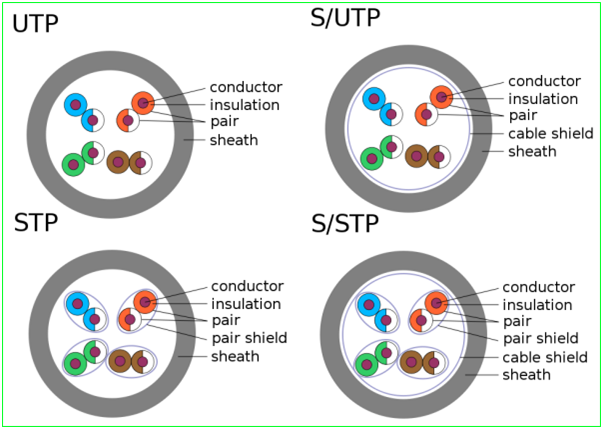Shielded (STP) and Unshielded (UTP) Twisted Pairs

Shielded Twisted Pair (STP) and Unshielded Twisted Pair (UTP) cables are among the most widely used cabling types in networking, building automation, and industrial communication systems. Both rely on pairs of copper conductors twisted together to reduce electromagnetic interference (EMI), but they differ significantly in how they handle noise, installation complexity, and grounding requirements.
The choice between STP and UTP cabling can directly impact network reliability, installation cost, maintenance effort, and long-term performance—especially in electrically noisy environments such as industrial plants, mechanical rooms, or buildings with heavy electrical equipment.
Shielded Twisted Pair (STP)
STP cables include an additional shielding layer designed to reduce external electromagnetic interference. Some STP cables use a thick braided copper shield, which provides strong protection against noise but also makes the cable heavier, thicker, and more difficult to install compared to UTP.
Other STP variants use a thin foil shield wrapped around the twisted pairs. These are often referred to as screened twisted-pair (ScTP) or foil twisted-pair (FTP) cables. Foil-shielded cables are thinner and typically less expensive than braided STP, but they are more fragile. If the minimum bend radius or maximum pulling tension is not strictly followed during installation, the foil shield can tear or crack, reducing its effectiveness.
STP cabling systems require careful attention to installation practices. Shield continuity must be maintained end-to-end, and connectors, patch panels, outlets, and termination hardware must all support shielding. Any break in the shield can degrade overall signal quality.
Unshielded Twisted Pair (UTP)
UTP cable does not rely on physical shielding to block interference. Instead, it uses balanced signal transmission and noise cancellation techniques. External noise is induced equally on both conductors of a twisted pair and is canceled out at the receiver.
With properly designed, manufactured, and installed UTP cable, networks are often easier to maintain than STP systems. There are no shielding continuity or grounding concerns, which simplifies installation and reduces the risk of installation-related performance issues.
Because of its simplicity, flexibility, and lower cost, UTP is widely used in commercial buildings, data centers, and building automation networks where electromagnetic interference is moderate and well-controlled.
Grounding and Installation Considerations
One of the most critical differences between STP and UTP is grounding. STP cabling systems require proper grounding and earthing practices to be effective. An improperly grounded shield can actually become a source of emissions and interference rather than a solution.
If STP cable is used with improperly shielded connectors, outlets, or patch panels—or if the shield itself is damaged—overall signal quality may be degraded. This can lead to reduced noise immunity and increased emissions.
Grounding requirements also depend on signal frequency. For high-frequency applications, STP cable must be grounded at both ends of the cable run and the shield must remain continuous. A shield grounded at only one end is not effective against magnetic-field interference and may provide limited benefit.
Practical Recommendations
- Use UTP in typical office, commercial, and building automation environments with controlled EMI.
- Consider STP in industrial settings, near variable-frequency drives (VFDs), motors, or high-power electrical equipment.
- If choosing STP, ensure that all components (connectors, patch panels, outlets) are shielded and properly grounded.
- Follow manufacturer guidelines for bend radius and pulling tension to avoid damaging foil shields.
- Avoid STP unless grounding practices are clearly defined and consistently implemented across the installation.
FAQ
1) What is the main difference between STP and UTP?
STP uses physical shielding to reduce interference, while UTP relies on balanced signal transmission and noise cancellation. STP offers better protection in noisy environments but is more complex to install and ground.
2) Is STP always better than UTP?
No. In many installations, UTP performs just as well or better because it avoids grounding and shield continuity issues. Poorly installed STP can perform worse than well-installed UTP.
3) When should STP be used?
STP is most appropriate in environments with high electromagnetic interference, such as industrial facilities, power plants, or locations with large motors and high-current equipment.
4) Does STP require special connectors?
Yes. To maintain shielding effectiveness, all connectors, outlets, and termination hardware must support shielding and maintain continuity through the entire cabling system.
5) What happens if STP is not grounded properly?
Improper grounding can cause the shield to act as an antenna, increasing emissions and susceptibility to interference instead of reducing it.
6) Is UTP easier to maintain?
Yes. UTP systems are generally easier to install, troubleshoot, and maintain because they do not rely on shield continuity or grounding schemes.
7) Does cable shielding affect data speed?
Shielding itself does not increase data speed, but it can help maintain signal integrity in noisy environments, which may improve reliability at higher data rates.